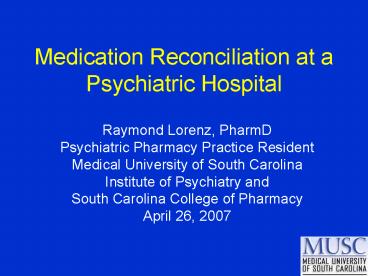Medication Reconciliation at a Psychiatric Hospital - PowerPoint PPT Presentation
1 / 18
Title:
Medication Reconciliation at a Psychiatric Hospital
Description:
Matching the patient's admission medications to their inpatient medication profile ... to occur and length of time from admission to reconciliation. Objectives ... – PowerPoint PPT presentation
Number of Views:289
Avg rating:3.0/5.0
Title: Medication Reconciliation at a Psychiatric Hospital
1
Medication Reconciliation at a Psychiatric
Hospital
- Raymond Lorenz, PharmD
- Psychiatric Pharmacy Practice Resident
- Medical University of South Carolina
- Institute of Psychiatry and
- South Carolina College of Pharmacy
- April 26, 2007
2
Institute of Psychiatry
- Academic teaching center
- Medical University of South Carolina
- 100-bed acute care psychiatric facility
- General adult, child, geriatric, substance abuse
and dependence, acute care, electroconvulsive
therapy - Average length of stay is 7 days
- Attending psychiatrist model
3
Background
- According to Joint Commission
- Accurately and completely reconcile patient
medications across the continuum of care - Medication reconciliation (med rec)
- Prevent medication misadventures
- Decrease rates of adverse events
- Minimal literature of med rec in a psychiatric
hospital
4
Background
- Med rec at the Institute of Psychiatry
- Admitting practitioner completes medication
history - Pharmacist reviews medication history against
medications ordered on inpatient profile - Any discrepancies are discussed with patients
treatment team - Pharmacist documents med rec performed
- List can be updated
5
Methods
- Med rec defined as
- Matching the patients admission medications to
their inpatient medication profile - Coordination with outside facility
- Medication history, if needed
- Perform med rec on 300 charts in a 2 month period
(Sept Oct 2006)
6
Methods
- Following data was collected
- Patient demographics
- Number of medication histories completed by
admitting practitioner - Number of reconciliations performed by
pharmacists - Number of home medications
- Number and type of interventions made by
pharmacists - Omissions, commissions, clarifications
- Time for med rec to occur and length of time from
admission to reconciliation
7
(No Transcript)
8
(No Transcript)
9
Objectives
- What is our rate of compliance with the Joint
Commission goal of medication reconciliation on
admission? - How long does it take to perform medication
reconciliation at IOP? - What are the most common interventions
pharmacists are making?
10
Results Demographics
- Total of 316 reconciliations performed over 46.7
hours - 49.4 of admissions (316/640)
- 52.8 within 24 hours
- 70 within 48 hours
- Gender, race, age indicative of patient
population - Diagnoses
- 48 mood disorders
- 20 psychotic disorders
- 14 childhood disorders
- 8 substance use disorders
- 9 other
11
Results Interventions
12
Results Interventions
13
Results Interventions
- Type of intervention
- 85 clarifications
- 14 omissions
- 1 commissions
- Medication history done by admitting team
- 99.97 compliance
- Medication history complete and accurate
- 76.3 compliance
- Documentation of continue on admission
- 69 compliance
14
Limitations
- Did not collect data regarding disparate
pharmacist coverage - Time for medication reconciliation may be longer
- Lack of medication histories collected by
pharmacists - Did not reach 100 medication reconciliation rate
- Transfer and discharge aspects of medication
reconciliation not assessed
15
Conclusions
- About 50 of medication reconciliation was
completed - When pharmacists perform medication
reconciliation, on average about one intervention
is made per patient - Interventions are clarifications to current
therapy - About 9 minutes per patient
- Admitting team should document if medications
should be continued on admit - More pharmacy staff is needed to meet the JCAHO
goal of 100 medication reconciliation
16
Acknowledgements
- Amy VandenBerg, PharmD, BCPP
- Shannon Drayton, PharmD, BCPP
- Elisabeth Mouw, PharmD
- Lizbeth Hansen, PharmD
17
References
- 1. Joint Commission on Health Care Accreditation.
National Patient Safety Goals. Accessed from
http//www.jointcommission.org/PatientSafety/Natio
nalPatientSafetyGoals/06_npsg_facts.htm. Accessed
on 7/28/06 - 2. Vira T, Colquhoun M, Etchells E. Reconcilable
differences correcting medication errors at
hospital admission and discharge. Qual Saf Health
Care 200615(2)122-6 - 3. Cornish PL, Knowles SR, Marchesano R, et al.
Unintended medication discrepencies at the time
of hospital admission. Arch Intern Med
2005165(4)424-9 - 4. Tam VC, Knowles SR, Cornish PL, et al.
Frequency, type, and clinical importance of
medication histpry errors at admission to
hospital a systematic review. CMAJ
2005173(5)510-5 - 5. Nickerson A, MacKinnon NJ, Roberts N, Saulnier
L. Drug therapy problems, inconsistencies, and
omissions identified during a medication
reconciliation and seamless care services.
Healthc. Q. 20058 Spec No65-72 - 6. Rodehaver C, Fearing D. Medication
reconciliation in acute care ensuring an
accurate drug regimen on admission and discharge.
Jt Comm J Qual Saf 200531(7)406-13
18
Questions?































